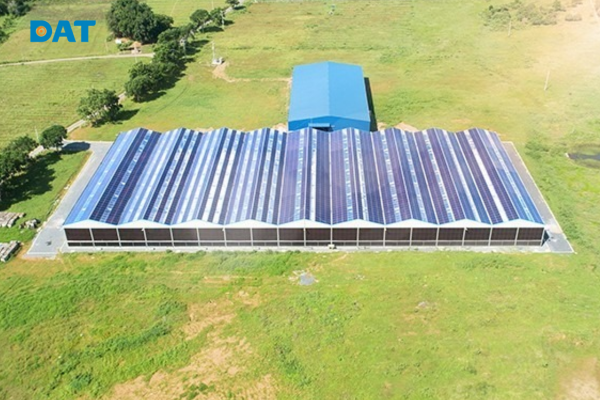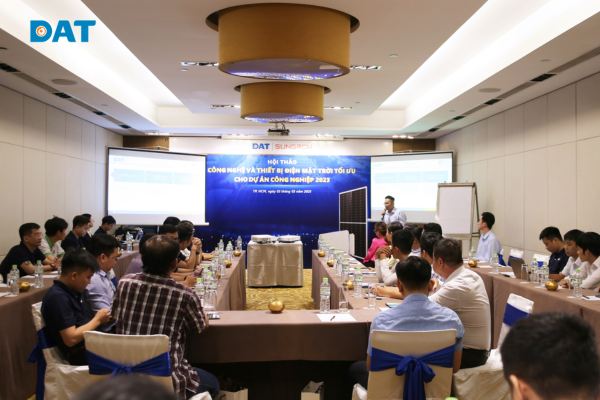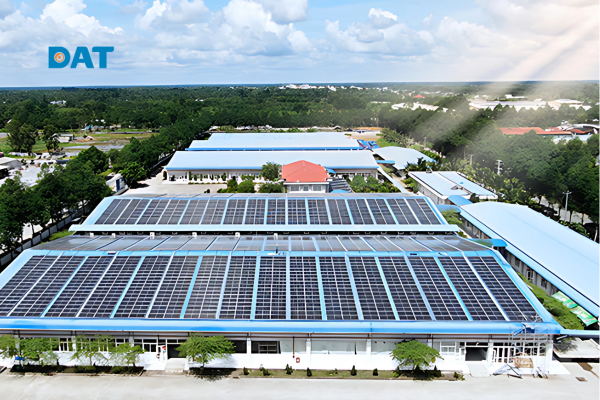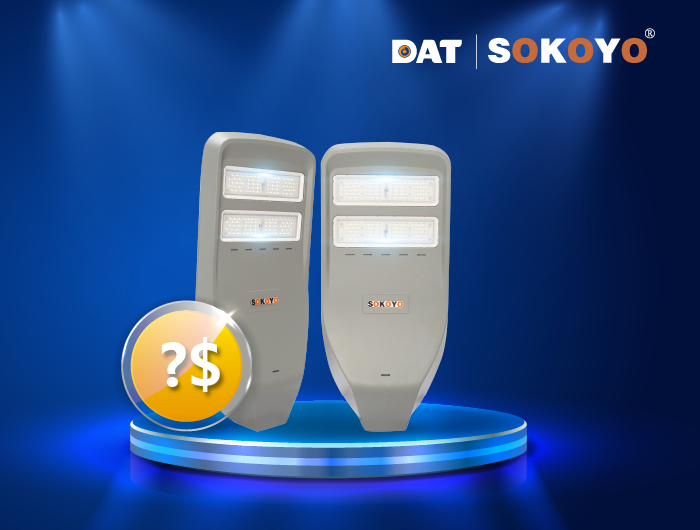The rise of solar energy in Vietnam: Opportunities & challenges
Vietnam is rapidly emerging as a regional leader in solar energy in Vietnam, driven by abundant sunlight and strong government support. Over the past decade, the country has witnessed exponential growth in solar power capacity, transforming its energy landscape toward sustainability. This growth is supported by a rising demand for professional solar panel installer services, ensuring that residential, commercial, and industrial projects are implemented efficiently and safely.
This article explores Vietnam’s solar energy journey, from early development and policy frameworks to current market dynamics and future prospects. Discover how DAT Group, a certified solar panel installer in Vietnam, provides cutting-edge solar solutions to help households, businesses, and investors benefit from this clean energy revolution.
1. Introduction to Vietnam’s solar energy journey
Vietnam has experienced an extraordinary expansion of solar energy in Vietnam over the last decade, transforming its energy landscape. From initial pilot projects to becoming one of Southeast Asia’s leading solar markets, this journey reflects the country’s commitment to sustainable development.
This section explores the early development milestones, the strategic importance of solar energy in Vietnam’s national plan, and the economic and environmental benefits that come with the solar boom.

1.1 Early development and milestones
Vietnam’s journey in solar energy began with pilot projects and small-scale installations in the early 2010s. Significant milestones include the launch of the Feed-in Tariff (FiT) policy in 2017, which rapidly accelerated solar adoption across the country. Since then, solar capacity has grown exponentially, positioning Vietnam as one of Southeast Asia’s fastest-growing solar markets.
1.2 Importance of solar energy in Vietnam’s national energy strategy
Solar energy plays a critical role in Vietnam’s strategy to diversify its energy mix and meet rising electricity demand sustainably. The government prioritizes renewable energy to reduce dependency on coal and fossil fuels, aiming to increase solar’s share in the national power generation portfolio by 2030.
1.3 Economic and environmental impacts of solar energy
The expansion of solar energy contributes significantly to Vietnam’s economic growth by attracting investments, creating jobs, and fostering technology transfer. Environmentally, solar power helps cut greenhouse gas emissions, improve air quality, and support Vietnam’s commitment to international climate agreements.
2. Historical context and policy background
Understanding the policy evolution in Vietnam is key to grasping the rapid solar growth. This section details the Feed-in Tariff (FiT) policy that fueled initial expansion, the transition towards competitive bidding for new projects, and the current legal framework guiding solar energy development.
2.1 Feed-in tariff (FiT) policy and its role in solar growth
Vietnam’s FiT policy, launched in 2017, offered a fixed premium price of up to approximately 2,340 VND/kWh (equivalent to 9.35 US cents/kWh) for grid-connected solar projects. This guaranteed purchase price significantly de-risked investments, encouraging the rapid deployment of utility-scale and rooftop solar installations. The FiT mechanism proved highly successful, helping Vietnam meet and exceed initial solar capacity targets ahead of schedule.
2.2 Transition from FiT to competitive bidding mechanisms
With solar capacity expanding rapidly, the government moved to control costs and promote market efficiency by transitioning from FiT to auction-based competitive bidding from 2021 onward.
This new mechanism requires developers to submit bids to supply power at competitive prices, encouraging cost reductions while maintaining transparent and fair procurement. Auctions have helped Vietnam align solar prices with global market trends.

2.3 Current legal and regulatory framework for solar projects
Vietnam’s renewable energy sector is governed by a comprehensive legal framework covering licensing, grid connection, environmental standards, and power purchase agreements. Recent regulations streamline project approvals and promote grid access for renewable generators. The government also supports investment incentives such as tax breaks and land use facilitation, further stimulating solar sector growth.
3. Enabling conditions for solar development in Vietnam
Several factors underpin Vietnam’s rapid solar expansion. This section reviews Vietnam’s geographic advantages, grid infrastructure readiness, human capital, and financial incentives that enable robust solar growth.
3.1 Solar radiation and geographic advantages
Vietnam enjoys favorable solar radiation levels, averaging 4.5–5 kWh/m²/day in southern and central regions, providing a natural advantage for solar photovoltaic (PV) systems. The country’s long coastline and tropical climate ensure high sunlight availability year-round, allowing efficient energy generation and optimizing return on investment for solar projects.
3.2 Grid infrastructure and integration capabilities
Although Vietnam’s grid faces challenges due to rapid solar uptake, investments are underway to upgrade transmission capacity and improve grid management. Grid operators like EVN are implementing smart grid technologies and expanding infrastructure to enhance renewable energy integration and reduce curtailment risks, ensuring stable and reliable power supply.

3.3 Skilled workforce and technology transfer
Vietnam has developed a growing talent pool trained in solar technology design, installation, and maintenance. Collaboration with international technology providers has accelerated knowledge transfer, allowing local companies to adopt cutting-edge solutions and improve operational efficiency. Workforce development initiatives are crucial for sustaining sector growth.
3.4 Financial incentives and international support
Beyond government tariffs and auctions, Vietnam benefits from concessional financing and technical assistance from international organizations such as the World Bank, Asian Development Bank, and foreign governments. These support lower capital costs and provide capacity-building, making solar projects financially viable and scalable.
4. Vietnam’s position in the global solar energy market
Vietnam’s rapid growth positions it as a key player in Asia’s solar sector. This section benchmarks Vietnam’s installed capacity against regional peers and discusses future market trends.
4.1 Installed solar capacity and growth rates
With over 18 GW of installed solar capacity as of early 2025, Vietnam ranks among the fastest-growing solar markets worldwide. The country has consistently recorded annual growth rates exceeding 50%, driven by supportive policies and declining solar equipment costs.
4.2 Comparison with regional neighbors in Southeast Asia
Vietnam leads Southeast Asia in solar power capacity, surpassing Thailand and the Philippines. Its aggressive deployment, coupled with strategic investments and geographic advantages, distinguishes it from regional peers. Vietnam’s growing industrial base also fuels increasing commercial and industrial solar adoption.
4.3 Future projections and trends in solar energy deployment
Analysts forecast Vietnam’s solar capacity to exceed 30 GW by 2030, with increasing integration of energy storage, hybrid systems, and digital solutions optimizing solar’s value. Emerging trends include bifacial solar panels, floating solar farms, and smart energy management systems, enhancing efficiency and grid stability.
5. Key stakeholders and market players
Vietnam’s solar ecosystem involves multiple stakeholders from policy to implementation. This section highlights major actors shaping the market.
5.1 Role of government agencies: EVN and ministry of industry and trade (MOIT)
The Electricity of Vietnam (EVN) operates the national grid and facilitates power purchase agreements. MOIT formulates policies and regulatory frameworks, coordinating sector development. Their collaboration ensures alignment between policy goals and operational realities.
5.2 Leading solar companies and key distributors: DAT Group
DAT Group is a leading provider of smart energy solutions in Vietnam, established in 2006. The company offers comprehensive solar solutions including system design, equipment supply, professional solar panel installation, and after-sales maintenance. With more than 12,000 solar systems deployed nationwide, DAT Group has played a crucial role in promoting Vietnam’s energy transition. As a trusted solar panel installer for both residential and commercial projects, the company ensures every installation meets strict quality and safety standards.
5.3 Domestic and foreign investment landscape
Vietnam’s solar market attracts substantial domestic capital and foreign direct investment, including from Japan, South Korea, and Europe. Stable policies, attractive returns, and large untapped market potential continue to draw new investors, supporting robust sector expansion.
6. Challenges and barriers to overcome
Despite impressive progress, Vietnam’s solar sector faces challenges that require strategic solutions.
6.1 Grid congestion and energy storage limitations
Rapid solar penetration has caused localized grid bottlenecks and occasional curtailment, reducing energy utilization efficiency. Limited energy storage capacity hinders balancing supply and demand fluctuations, underscoring the need for grid upgrades and battery investments.
6.2 Policy and regulatory uncertainties
Frequent policy revisions and delays in implementing new mechanisms introduce investment risks. Clearer, stable regulatory frameworks and transparent auction processes are essential to sustain investor confidence and sector growth.
6.3 Cost competitiveness and market competition
Solar costs continue to decline globally, but competition from other energy sources and between solar developers pressures margins. Innovation in system design, scale economies, and financing structures are critical to maintain competitiveness.
6.4 Development of skilled human resources and advanced technologies
The sector requires continual training to meet growing technical complexity and adoption of advanced technologies. Investing in workforce development and research & development will ensure Vietnam retains its competitive edge.
Solar energy in Vietnam is rapidly evolving into a cornerstone of the country’s sustainable energy future. Boasting abundant sunlight, strong policy support, and dynamic market players like DAT Group, Vietnam offers compelling opportunities for energy users and investors.
At DAT Group, we deliver trusted, state-of-the-art solar solutions tailored for residential, commercial, industrial, and utility-scale needs. Whether you are looking for a residential solar panel installer to reduce your home electricity bills, or a commercial solar panel installation partner to optimize your business energy costs, our team is ready to help. Join us in powering a cleaner, greener Vietnam while maximizing your energy savings.
Visit our website: https://datsolar.com/
Contact DAT Group today to explore how our expertise as a top solar panel installer in Vietnam can help you harness the full potential of solar energy in Vietnam.















